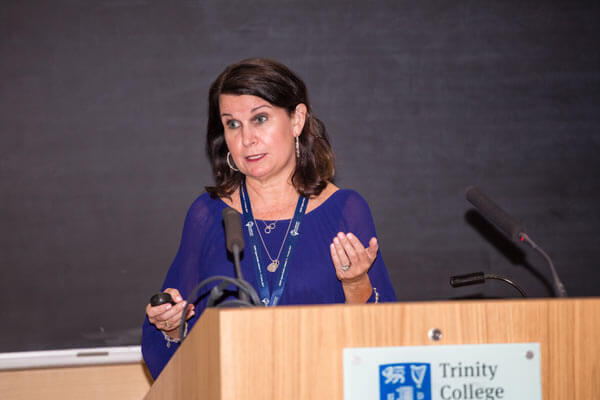Compassionate human interactions, access to meaningful information, support and participation of family and friends and a healing environment with support for body, mind and spirit mattered most to patients around the world and across care settings, Karin Jay, Senior Director, International Business, Planetree told the Agora.

She was speaking on “Advancing Patient and Family Centered Care: Partnership Strategies That Work,”at the invitation of the Private Hospital Association.
Planetree is a non-profit organisation that provides education and information in a collaborative community of healthcare organisations, facilities efforts to create patient-centred care in healing environments. It advocates between healthcare systems and patients, educates and coaches, is a standard setter and works with staff “who are the most powerful levers of change.”
Ms. Jay said patients’ top three concerns were dismissal/trivialization of the patient voice, absence of caring attitudes from providers and lack of continuity in care.
These patient views were based on an analysis of over 6,000 focus groups involving more than 50,000 patients, family members and professional caregivers across the care continuum carried out by Planetree over the past decade.
Patients’ top three concerns were dismissal/trivialization of the patient voice, absence of caring attitudes from providers and lack of continuity in care.
She gave three examples to illustrate the differences between what doctors thought their patients wanted and what the patients actually wanted.
“Doctors believe 71% of patients with breast cancer rate keeping their breast as top priority. The figure reported by patients is just 7%.1
Ms. Jay said Angelica Thieriot, who founded Planetree in 1978 said “As a patient I rebelled against being denied my humanity and that rebellion led to the beginnings of Planetree. We should all demand to be treated as competent adults, and take an active part in our healing. And we should insist on hospitals meeting our human need for respect, control, warm and supportive care, a harmonious environment and good, healthy food. A truly healing environment.” 2
Planetree believed healthcare providers should partner with patients and their families to anticipate and satisfy the full range of patient needs and preferences. Caregivers should support staff in achieving their professional aspirations and personal goals.”
A new patient-centred model should provide for patients to ask questions and ask about options and for the doctors to offer options and discuss the pros and cons.
She said the core concepts of patient/family centred care were:
- Respect and Dignity: Staff should listen to patients and family and see that their perspectives as well as choices were honored. The patients and family beliefs, values, knowledge and culture should be incorporated into the plan of care.
- Information: Staff should provide open complete information to patients and families in a timely manner to assist in participation in care and decision making.
- Participation: Patients and family should be invited to participate in care and decision making. Staff should support patients and family as necessary.
- Collaboration: Patients and family should be included in facility wide initiatives-policy, programs, implementation and evaluation, facility design, education and delivery of care.
Ms. Jay said that the definition of patient/family centred care became more obvious by stating what it was not. “It is not the diabetic in room 10 or the cardiac in room 12. That’s not patient-centered, that’s disease-centered. Worse still is ‘Doctor, room 11 needs something for pain.’ Can a room really be in pain! We are individuals, we are not our afflictions.
“Hippocrates’ holistic approach was that it was more important to know what sort of person had a disease than what sort of disease a person had.
Ms. Jay said that consumers demanded choices, wanted involvement in and control over their care, expected superior customer service and needed customized information.
It was important to know who was currently defining quality, how the patient was involved in defining optimal quality outcomes for themselves and how patient preferences were captured in the current processes.
Looking at the way forward, she said many patients continued to carry the old perceptions that doctors were gods and infallible. “The truth is we are living in a new age of medicine where much can be done and much can go wrong. There is a time and place for lawsuits but there is room for accepting the risks that come along with our modern miracles.
“A new patient-centred model should provide for patients to ask questions and ask about options and for the doctors to offer options and discuss the pros and cons. It should ensure that the patient focuses on family and other activities, that physicians should listen more and talk less and that the treatment accommodates patients ‘culture and values.
- Lee CN, Hulsman CS, Sepucha K. Ann Plastic Surg2010;64:563-6 Wagner E, et al. Med Care1995;33:765-70
- Covinsky KE, et al. J Am Geriatr Soc 2000; 48: Suppl: S187-S193.

